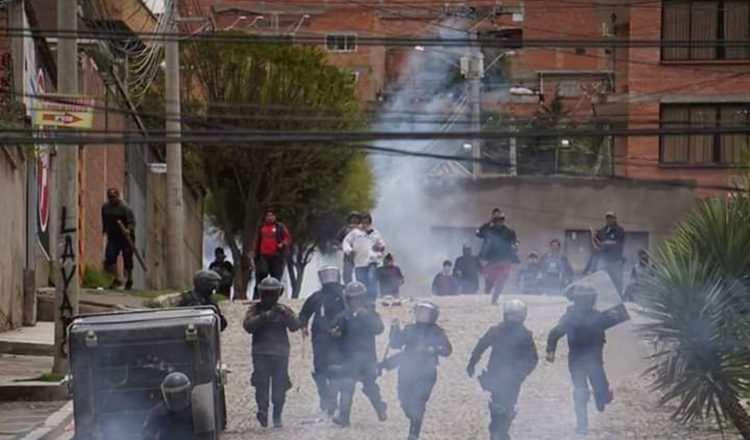From the January-February 2020 issue of News & Letters
New presidential elections in Bolivia are now scheduled for May. Evo Morales and his vice-president Garcia Linera are barred from participating. Their party, MAS, has yet to select its candidate. With an authoritarian Rightist government overseeing the process, it remains to be seen whether the election will be open and fair.
The consolidation of power, the racism and authoritarianism of those in control need to be opposed. But if we concentrate only on the “facts” of October-November we will find ourselves in the “pseudo-concrete,” and not grasp the reality of Bolivia in the first two decades of the 21st Century.
That reality is one of great social movement from below and, at the same time, grave contradictions imposed by the Morales/Garcia Linera leadership in their attitude to Indigenous opposition from below and their imposition of a statist ideology from above. To simply focus on a coup, undertaken by the military and perhaps supported by the U.S., when masses were questioning the election results, misses a crucial question: How did we arrive at this moment?
THE MORALES YEARS—ADVANCES AND CONTRADICTIONS

The years of the Morales-García Linera administration meant important changes in Bolivia: an end to the open racism of previous Bolivian governments, the writing of a new Constitution, improvements in the lives of millions. However, these did not occur without serious contradictions, including:
The writing of a new Constitution. Social movements had been calling for a new constitution demanding direct participation in a Constituent Assembly. However Morales and MAS orchestrated the writing of the Constitution via Party-ism. This gave the neoliberal Right a critical voice and the opportunity to weaken the demand for a transformative Constituent Assembly.
The TIPNIS (the Isiboro-Secure Indigenous Territory and National Park) conflict. The struggle over a proposed road to be built through the Amazonian region revealed two fundamental characteristics of the Morales-García Linera administration: 1) Its willingness to use violence against social protest movements, and to manipulate “consultas” (consultation with the Indigenous who will be affected by the Park) as well as take over organizations to impose its will. 2) Developmental-ism and State-ism as the economic foundation of those in charge.
Developmental-ism under the direction of a strong state became the defining mark of the Morales-Garcia Linera government: state-capitalism in partnership with neoliberalism. Its ideological base had been provided by the statist Marxism put forth by García Linera—“Andean-Amazonian capitalism” with a strong state presence.
POWER AND CREATIVITY OF THE MASSES
We need to remember the creative mobilizations of the Bolivian masses—2000-2005—that opened the door for the Morales election in 2006: the Water War in Cochabamba, 2000; the vast mobilizations of the Aymara in the altíplano in 2000, 2001 and 2003; the actions of the coca growers in Chapare, 2001-2003; the First Gas War of 2003; the powerful protests of Aymara in El Alto; and the Second Gas War of 2005. The campaign and election of Morales fundamentally changed the trajectory of this profoundly revolutionary half decade into one of electoral politics and manipulation rather than mass participation from below.
In the October 2019 election a substantial portion of the population rejected Morales’ attempt to extend his electoral rule for a fourth term. Though they supported him in the past, many have criticized his administration. Among them are significant groups of women—such as the Women’s Parliament which took place during and after the most recent events. They pointed to the machismo and the vanguardism of the Morales administration.
These masses strongly oppose the re-imposition of an authoritarian state. An authentic emancipatory future still belongs in their hands. The Bolivian thinker, feminist and activist Silvia Rivera Cusucanqui captured the thoughts of millions of indigenous Bolivians: This society has not renounced its right, its memory, its autonomy, and the fact that the Indian is in each one of us. We will not give up or go back to the past.
—Eugene Walker
